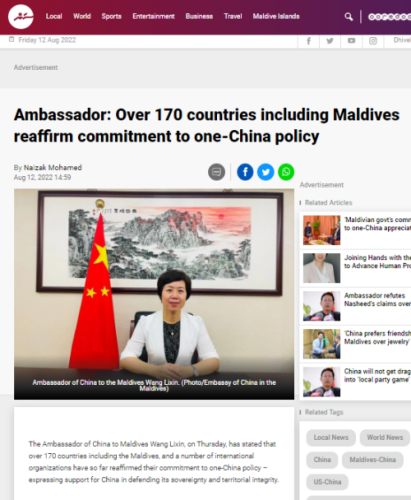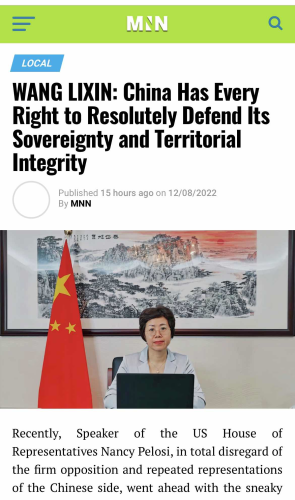On Aug 12, Ambassador Wang Lixin publishes in local media SunOnline and Maldives News Network an op-ed entitled China Has Every Right to Resolutely Defend Its Sovereignty and Territorial Integrity, in which Ambassador Wang clarifies the firm position of China on Speaker of the US House of Representatives Nancy Pelosi’s visit to China’s Taiwan region, and explains in detail the history and reality of the Taiwan question. The full text is as follows.

Recently, Speaker of the US House of Representatives Nancy Pelosi, in total disregard of the firm opposition and repeated representations of the Chinese side, went ahead with the sneaky visit to China's Taiwan region. This reckless move seriously infringed on China's sovereignty and territorial integrity, seriously interfered in China's internal affairs, seriously violated the commitments made by the US side, and seriously jeopardized peace and stability across the Taiwan Straits. China has every reason to respond with countermeasures to defend its sovereignty and territorial integrity.
Taiwan is part of China, which is an indisputable fact. Taiwan question is a purely China’s internal affair and no other country is allowed to have a hand on it. There is but one China in the world, Taiwan is an inalienable part of China’s territory. This fact is crystal clear and is solidly grounded in history and law. Taiwan has belonged to China since ancient times. The Chinese government of different periods set up administrative bodies to exercise jurisdiction over Taiwan. In April 1895, through a war of aggression against China, Japan forced the Qing Government to sign an unequal treaty and forcibly occupied Taiwan. In December 1943, the Cairo Declaration was issued by the Chinese, US and British governments stipulating that Japan should return to China all the territories it had stolen from the Chinese, including Northeast China, Taiwan and Penghu Archipelago. The Potsdam Proclamation signed by China, the United States and UK in July 1945 (later adhered to by the Soviet Union) stipulated that “The terms of the Cairo Declaration shall be carried out.” In August of that year, Japan surrendered and promised in its instrument of surrender that it would faithfully fulfill the obligations laid down in the Potsdam Proclamation. On October 25, 1945, the Chinese government recovered Taiwan and the Penghu Archipelago, resuming the exercise of sovereignty over Taiwan. In October 1971, the United Nations General Assembly adopted at its 26th session Resolution 2758, which expelled the “representatives” of the Taiwan authorities and restored the seat and all lawful rights of the government of the People’s Republic of China in the United Nations. Any country’s attempt to have official interactions with Taiwan is to crudely interfere in China’s internal affairs and violate the basic norm of international relations.
Any provocation on the one-China principle is unacceptable. The one-China principle is the prevailing consensus of the international community and a widely-accepted basic norm of international relations confirmed by UNGA Resolution 2758. It is also the centerpiece of the three Sino-US joint communiqués, and the premise and foundation for the establishment and development of diplomatic relations between China and the US. It is a red line that must not be crossed. The US claims that there is no change in its one-China policy and Pelosi’s visit does not violate the one-China policy. But in fact, the three joint communiqués provide that the US can only maintain cultural, commercial and other unofficial relations with Taiwan. Pelosi’s visit to China’s Taiwan region is a dangerous, malicious provocation. Pelosi is the number three figure in the US Government. During her stay in Taiwan, she was speaking on behalf of the US from the beginning to the end. Even she herself admitted that it was an official visit. Pelosi’s move recklessly trampled on the one-China principle and the basic norm of international relations. The US side's sophistry is tantamount to deceiving itself and others.
Undermining the peace and stability across the Taiwan Straits is unacceptable. The status quo of the Taiwan Straits is that both sides of the Straits belong to one and the same China, Taiwan is part of China, and neither China’s sovereignty nor its territorial integrity is ever divided. It is not China who is changing the status quo, but the US and the “Taiwan independence” separatist forces. Now, the Taiwan Straits is facing a new round of tension and serious challenges. The main reason lies in the repeated efforts of the Taiwan authorities and the US side to change the status quo. The Taiwan authorities have kept seeking US support for their independence agenda, refused to recognize the 1992 Consensus that embodies the one-China principle, and promoted “de-sinicization” in an attempt to realize “incremental independence”. The US side, in an effort to use Taiwan to contain China, has continued to distort, obscure and hollow out the one-China principle, thus emboldening “Taiwan independence” separatist activities. China’s countermeasures to defend its sovereignty and territorial integrity are nothing but justifiable defense. They are just and lawful. It is the sacred right of every sovereign state, free of external interference.
The process of China’s complete reunification cannot be halted. The will of the Chinese Government and people to resolutely defend the sovereignty and territorial integrity of the country is indestructible. To realize the complete reunification of the motherland is the common aspiration and sacred responsibility of all Chinese sons and daughters. We are willing to seek peaceful coexistence and common development with other countries. But we will not allow any country or force to undermine China’s sovereignty and territorial integrity. As President Xi Jinping pointed out, China's commitment to peaceful development is however premised on the absence of any encroachment upon our national core interests. We will never give up our legitimate rights and interests. No foreign country should harbor the illusion that we would trade our core interests, or allow harm to be done to our sovereignty, security or development. The Taiwan question arose as a result of weakness and chaos in our nation and it will be resolved as national rejuvenation becomes a reality. The trend of this process is irresistible. Aggressively making trouble on Taiwan question in an attempt to obstruct the historical process of China’s reunification and national rejuvenation will be totally futile and doomed to failure.
Justice lies in the hearts of people. So far, more than 170 countries including the Maldives and a number of international organizations have spoken up for what is right, reaffirming their firm commitment to the one-China principle and expressing support for China in defending its sovereignty and territorial integrity. Both the President of the UN General Assembly, Maldivian Minister of Foreign Affairs Abdulla Shahid and UN Secretary-General António Guterres have stated that the UN will continue to adhere to General Assembly Resolution 2758, the centerpiece of which is the one-China principle. The voice of justice of the international community is not only a strong support for China, but also the common aspiration in opposing hegemony and safeguarding the authority of UN.
Over the past 50 years since the establishment of the diplomatic relations between China and the Maldives, the two countries have always understood and supported each other on issues of our respective core interests and major concerns. The Maldivian Government has a longstanding commitment to the one-China principle and reaffirmed this position recently, which the Chinese side highly appreciates. China is always ready to work together with the Maldives to push forward the bilateral relations based on the solid political foundation to a new level so as to safeguard the purposes and principles of the UN Charter and maintain regional stability and world peace.

